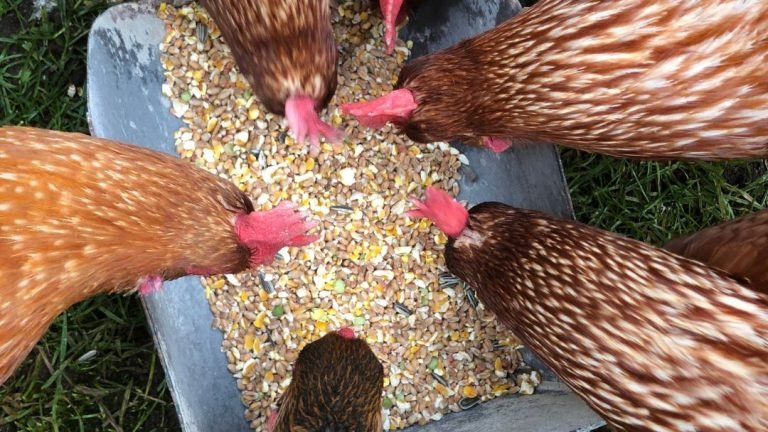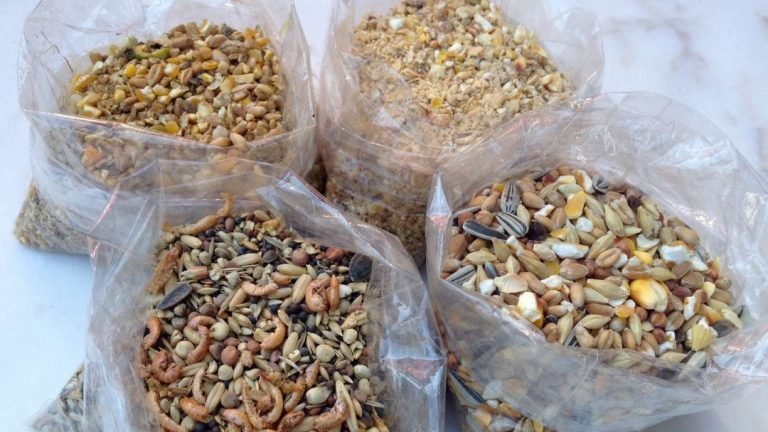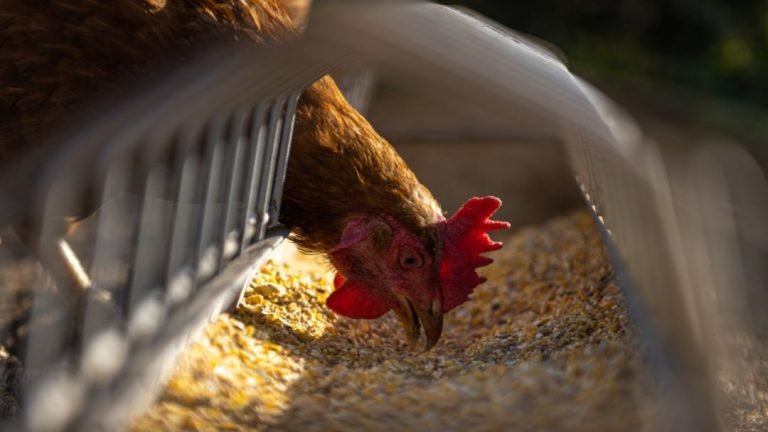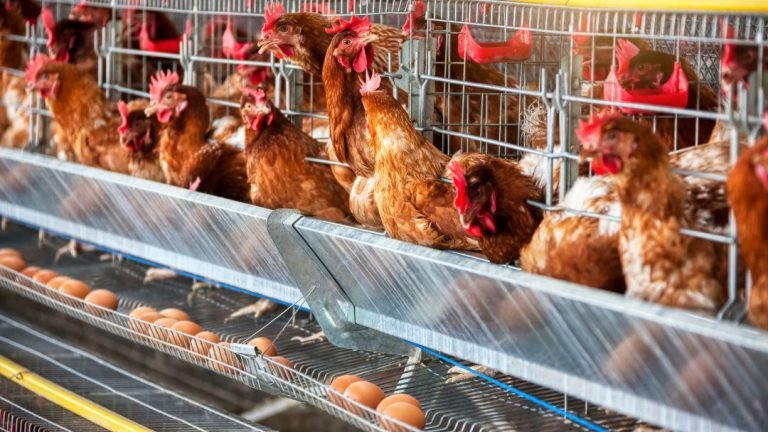Do you serve the same chicken feed for all chickens? If your chicken coop has chooks of various ages, they must be fed based on their age. Chicks need starter feed, whereas teenage flocks need grower feed. Feeding the right option at the right time will ensure optimal growth.
What are the differences between chick starter vs grower feed? Chick starter is ideal for baby chicks aged between 0-8 weeks. They contain 20% to 22% of protein, less fat and fiber than grower feed but higher energy content than grower feed. Grower feed is ideal for teenage chickens aged between 8-18 weeks. But it has only 18% of protein.
| Specifications | Starter Feed | Grower Feed |
|---|---|---|
| Ideal Age | 0-8 weeks | 8 to 18 weeks |
| Protein Level | 20% to 22% | 18% |
| Calcium Level | Less than 1% | 0.8% to 1.2% |
| Fat And Fiber | A little bit lower | A bit higher |
| Purpose | Grow stronger and faster | Ensure continuous growth |
| Texture Type | Mash or crumbles | Crumbles or pallets |
| Energy Content | Higher energy content to support growth | Slightly lower energy content for controlled growth |
| Nutrient Profile | Higher levels of essential vitamins and minerals | A balanced blend of essential nutrients |
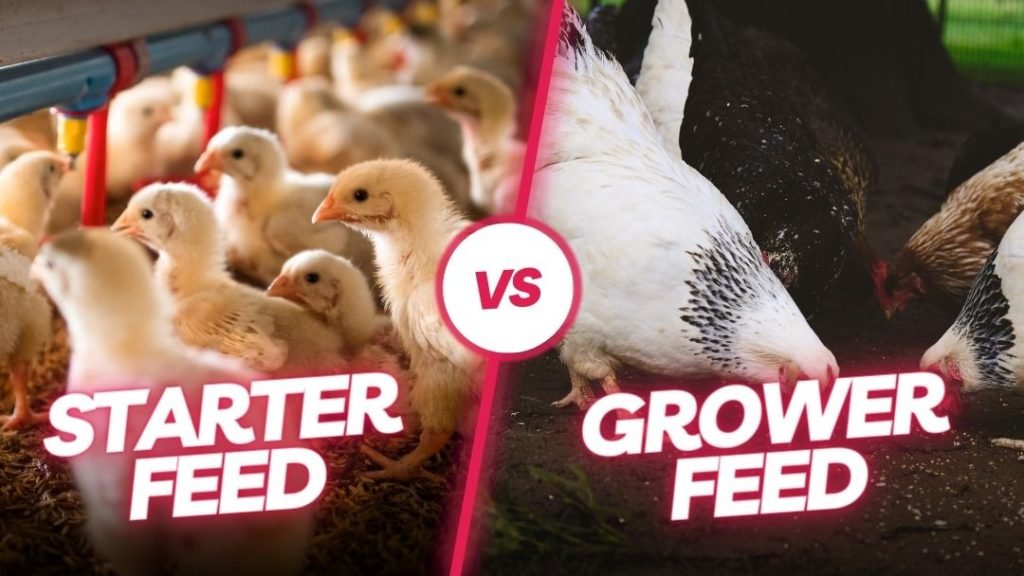
Chick Starter Vs Grower Feed: What Are The Differences?
Can you feed grower feed to baby chicks or starter feed to teenage chickens?
Why you can’t feed them exchangeably? Will they affect both types of chickens if you serve the wrong food?
Let’s learn how chick starter feed is different from grower feed and why you should only feed the particular food to specific ages of birds.
01. Ideal Age
Starter feed is mainly suitable for baby chicks that are recently hatched. You can start feeding them this type of food from day 1.
Some chicken owners shift to grower feed after 6 weeks. But if your younger chickens are growing slowly, you can continue feeding grower feed for up to 8 weeks.
Considering your chicken breed type is essential. Some breeds grow faster than regular ones. You can start feeding them grower feed after 4 to 6 weeks.
Contradictorily, grower feed is suitable for teenage folks when they become 6 to 8 weeks. You can continue feeding this food for up to 18 weeks.
Usually, chicken growers keep feeding grower feed until they reach the laying phase. Birds start laying eggs when they are 18- 22 weeks old.
It is better to start feeding laying feed just 2 or 3 weeks before they start laying eggs. Laying feed contains a higher amount of calcium to create stronger eggshells.
02. Protein level
Chick feed contains around 20% to 22%. But most commercial chicken feed has 20% protein on average.
A few brands sell start feed that contains 22% to 23% of protein. It is best to take suggestions from an experienced poultry veterinarian to determine how much protein they need.
Baby chicks need more protein to grow rapidly and develop muscles. Plus, higher protein helps chicks to cope with winter stress properly.
In opposition, grower feed contains around 18% protein on average. Teenager chooks will not grow as much as younger chickens.
You just want to serve them enough protein to fulfill the daily nutrient requirements. Feeding too much protein for weeks may lead to kidney failure.
Besides, it may cause other potential health issues, such as liver damage, excessive weight gain, etc.
03. Calcium Level
Both young and teenage chickens need a minimal amount of calcium because it is more necessary for laying birds. It helps hens to lay eggs with stronger eggshells.
Feeding an excessive amount of calcium can harm their kidneys as their body struggle to absorb too much calcium.
But do baby chicks and teenage chickens need the same level of calcium? Usually, it is almost the same.
Youngsters need less than 1% of calcium, whereas teenage chooks need around 0.8% to 1.2% of calcium.
Both need a minimal amount of calcium to support various important body functions, such as the circulatory system, the nervous system, etc.
It also helps them to build and support healthy bones. Generally, experts recommend feeding chickens around 4-5 mg of calcium per day to meet their body needs.
04. Fat And Fiber
Both starter feed and grower feed contain dietary fiber to help birds digest and absorb the food in their small intestine.
As teenage chooks continue growing and become mature, they will need a bit higher fiber to promote a healthy gut system.
Chick feed generally contains 2% to 3% fats, whereas grower feed has around 5% fats on average.
A single gram of fat provides 9 calories. Teenage chickens lose their energy faster than baby chicks. Hence, they need more energy to survive.
05. Purpose
Chick feed allows small birds to cope with the solid feed easily. It can fulfill all the dietary requirements of baby chicks and support optimal growth as they will grow at lightning speed.
In addition, a high-quality starter-grower feed contains 38 nutrients to help baby chicks grow and develop consistently.
It also makes their bone health and boosts their immune system. Starter feed has amino acids, vitamins, and minerals besides protein.
On the other hand, grower feed is fed chooks to make teenage birds healthy and productive. It also ensures consistent growth until they lay eggs.
06. Texture Type
Chick starter feed comes mash or crumble texture. Chickens will get a consistent amount of proteins, vitamins, and minerals in each bite from mash-based chick food.
This type of food is easy to consume and digest. You can also serve them with hot water, especially if your feathered friends are sick.
When it comes to a nutritionally complete and balanced diet, Crumbled feed is a great choice.
However, chickens may waste some food as chickens may eat their preferred sizes of food instead of eating all.
In contrast, grower feed mainly comes in crumbles or pallets. Are you teenage chickens not eating enough food regularly? Have you seen a significant weight loss?
If so, pallet-based grower feed can be the perfect choice for live weight gain. It will improve their feed conversion ratio.
Besides, pallet feed causes minimal dust and waste. That’s why 50% to 55% of chicken owners prefer feeding this type of feed.
07. Energy Content
Chick starter feed contains higher energy content to support faster growth and feather development.
Moreover, higher energy content enables baby chicks to maintain a balanced body temperature, especially during the colder months.
It improves their FCR. Due to the higher nutrient density and digestibility of this type of feed, birds will gain weight faster.
On the contrary, grower feed contains a slightly lower energy content for controlled growth.
Otherwise, teenage chooks will gain too much weight. They will get fewer calories per gram than starter feed due to reduced energy density.
08. Nutrient Profile
Starter feed contains higher levels of essential vitamins and minerals to stay healthy and in peak performance.
It helps them to grow muscles and develop features. They are full of various water- and fat-soluble vitamins, potassium, and phosphorus.
They need these vitamins and minerals more to make their immune system stronger and enable their body to fight against various diseases and other challenges.
Contrarily, grow feed contains a balanced blend of essential nutrients because their growth phase is almost completed.
You just want to feed them adequate amounts of essential nutrients to support their overall health and well-being.
Can You Feed Starter Feed To Teenage Chickens?
It is necessary to shift to grower feed once your younger chickens become 8 weeks old.
They have already grown enough and consumed higher levels of protein for 8 weeks.
Feeding too much protein to teenage chickens for several days will cause various health issues.
It may harm or damage their kidneys and liver. Besides, they will gain too much protein.
You just need to feed them the right amount of protein for maintenance purposes.
Hence, serving starter feed to teenage chickens means you are over-feeding protein.
You should immediately shift to grower feed once your baby chicks have completed eight weeks.
Can You Feed Grower Feed To Baby Chicks?
Yes, you can feed grower feed to recently hatched tiny chicks. But it will not be as effective as starter feed.
After all, grower feed contains less protein than starter feed. Chooks need a higher level of protein in their early stage of life to support faster growth.
Feeding grower feed to baby chicks will slow down their potential growth. They won’t gain as much weight as you want.
Hence, it is best to serve the chick feed to baby chicks at least for the first 4 to 6 weeks. If you notice slower growth, you can continue feeding them for up to 8 weeks.
Final Verdict
Are you still wondering about the difference between chick starter vs grower feed? A lot of brands are available in the market. Before choosing a particular option, go through the product level carefully. If your chooks have any health issues, take suggestions from your veterinarian.
Some top brands may charge a bit more for high-quality products. Make sure to select a feed that is free from harmful ingredients. You may need to change the food if your feathered friends don’t like it. Buy a small option to test their preference before going for a larger option.

